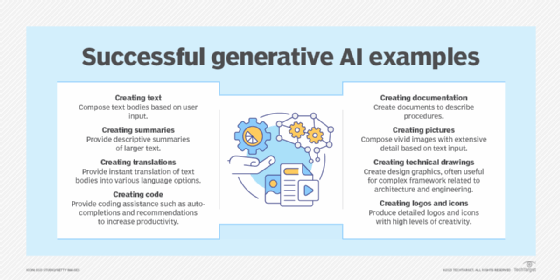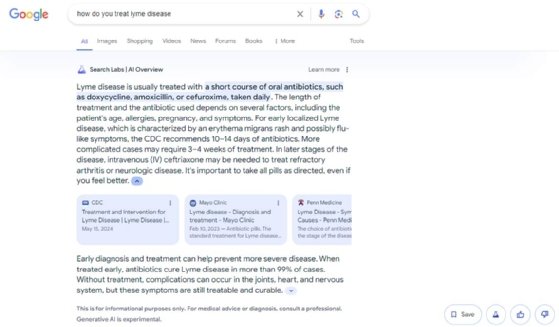
KOHb - Getty Images
How AI will affect the future of content marketing
Content marketing has changed over time. Generative AI will likely transform it even further. Here's how marketers are handling and preparing for this AI evolution.
Generative AI might not take marketers' jobs, but it might make them more difficult for now.
Many AI vendors tout how the technology can streamline marketers' workflows and increase efficiency. Yet, AI's advancements have also made marketing harder. Even if marketers use AI to craft content, search engines, like Google and Bing, have added AI overviews to the top of their results pages. These overviews make it unnecessary to click on an article to get an answer, therefore stopping potential leads from seeing marketers' content.
This duality of AI was top of mind for presenters and attendees at HubSpot's Inbound 2024 conference in Boston. Many presenters expressed confidence in AI's capabilities, yet some attendees weren't convinced.
"I'm not totally sold on it, but I think we can't ignore it. You couldn't ignore the internet however many years ago. ... It's not going away," said Patricia McLaughlin, senior manager of graphics and marketing at a healthcare consulting firm, in an interview.
How marketers use AI
ChatGPT represents the popular image of AI-generated content. A user asks the tool to write something, and then it creates text-based content based on the user's request. This idea sparked the fear of AI in many marketers: If AI can create the content they make, then could it eliminate marketing jobs?
This outcome is unlikely, according to Cameron Adams, co-founder and chief product officer at Canva. At an Inbound session titled "Advancing Human Creativity with AI," Adams said any AI output requires a human touch. AI can help marketers ideate, storyboard new campaigns or create multimedia, but marketers will always have the final say.
1. Ideation
Ideation is the main AI use case for Roxanne Doche, vice president of marketing for an automotive recruiting company. Doche was a beta user for ChatGPT and has used the tool for multiple years to help with search engine optimization (SEO), like finding keywords and optimizing content with keywords.
"I think it's a great assistant. … I think it really can help spark creativity, but there's an element of human touch, emotion and knowledge that needs to be applied," Doche said in an interview.
Specifically, Doche has used AI tools to help her repurpose existing content. For example, she can plug a full article into ChatGPT and ask it to create social media posts, summaries or new pieces of content to complement that article.

2. Multimedia creation
Even if a search engine results page (SERP) offers an AI overview based on the top articles for a user's query, it rarely includes, or generates, its own images. Charts, graphics, videos and other multimedia can help marketers stand out on SERPs. However, small marketing teams -- like McLaughlin's and Doche's -- may not have a designer on staff.
This is where AI comes into play. When created properly and ethically, AI-generated art can help marketers create images or videos to post on social media or accompany their articles. This is especially helpful for marketers who may not have graphic design experience.
"Anything that we can do to maximize what we're doing with the amount of people that we have and the amount of time we have to do it is a win," McLaughlin said.
AI art tools, like OpenAI's Dall-E and Adobe Firefly, serve this purpose. Canva, a graphic design platform, is integrating with AI tools like ChatGPT to suggest existing graphics or templates to include with social media posts. However, many of these tools and integrations are still nascent, so they don't yet help as much as they might in several years.
3. Workflow automation
One of AI's most touted benefits is automated workflows, but marketers might struggle to understand what that means for their daily lives.
For Doche, automation goes beyond content ideation. As a member of a small team that has several different responsibilities day to day, AI could help Doche streamline communications among co-workers in an approval process.
"If X happens, then Y gets notified, then you get a Slack [message], so you don't have to go back and check the report because now you're notified when a lead comes in," Doche said.
This automation can improve collaboration between sales and marketing teams, as it can let all relevant parties know when to take action on a lead or simply update them on a project's status.
Challenges with AI-generated marketing content
Despite what marketers can already do with AI tools, the technology is still new and expected to transform and improve over time. For now, marketers still face several challenges with AI.
1. Lack of knowledge and training
If content creators fear generative AI could replace their jobs, then organizations might believe it, too. So, some organizations -- primarily small businesses or startups -- might invest in a couple AI content tools rather than actual marketers. Doche said this is a mistake because AI only works properly when someone understands how to apply it correctly.
"You have to have some level of intelligence to use it correctly; otherwise, it could blow up," Doche said. "If you're not using it correctly and you post on your site, then these AI bots, ironically enough, are going to shut your site down because it's all AI-generated content, which AI knows can't be trusted."
Like any tool, AI mostly benefits people who know how to use it. It can't replace people who have experience in the field, like actual marketers. Organizations must balance investments in AI with investments in talent to ensure they get the most out of both tools and employees.
2. AI overviews
No matter how AI can benefit content creation, content marketing strategies are less likely to bring in leads than in years past, due to AI overviews at the top of SERPs. Already, these overviews result in fewer clicks for articles on SERPs, and Gartner predicted traditional search volume will drop 25% by 2026.

For marketers who rely primarily on SEO to bring in organic traffic, this news can seem daunting. However, Doche said she invests in multichannel strategies, which she said would minimize the repercussions of this hurdle.
"You just have to work around it. You have to get more creative. … You have to be everywhere to get people to come to you, versus just relying on Google to choose you as the expert," Doche said.
Multichannel strategies can improve customer engagement and give marketers and sales reps more insights into their audiences. However, these strategies require more work than small content marketing teams may be able to handle without sufficient help.
3. Not fully developed technology
Because generative AI is not yet a mature market and vendors continue to create new tools, this ever-changing market can overwhelm businesses.
"The tricky part for us, as a small business, is, as these new AI tools are coming in, we have to decide where we're going to invest our time and our resources," Doche said.
Organizations might choose to invest in one tool for a year and then discover another tool suits their needs better several months into the initial investment. Businesses with smaller or less flexible budgets might choose to use free versions of tools, like Microsoft's Copilot, which is freely available on Bing, rather than invest in a service that might not fulfill their needs.
The future of AI in content marketing
When people don't understand how to use AI, they can become discouraged and not want to use the tool again. For example, if a user asks ChatGPT to write a blog post about a certain topic following SEO best practices, the result likely won't be good or seem too heavily AI-generated. After that, the user may give up on the tool or be unwilling to try another.
Doche's years of experience with ChatGPT helped her determine what AI tools can and cannot do, and prompt engineering has become critical. Often, Doche gives the tool a few commands to see what it understands. She reworks prompts several times and then often returns to the original response and edits from there, pulling pieces from each response until she gets a result that works.
Overall, like any new technology, users must adapt to new strategies and best practices. AI also needs time to mature for its full effect on content marketing to be known.
"I think AI has to get there," McLaughlin said. "I think it will get better as people use it more and if there's more data out there and it's more visual. I think right now … the jury's still out on AI."
Michaela Goss is senior site editor for TechTarget's Customer Experience and Content Management sites. She joined TechTarget as a writer and editor in 2018.






